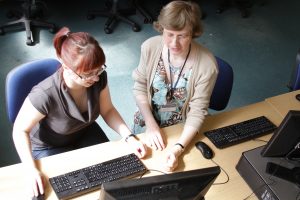Ahhh, it’s New Year, when so many of us wake up and resolve never to do *that* again… But it’s also a chance to look back over the year, and think about what we could be doing differently. If you’re resolving to change your ways this year, the Library and Study Advice can help!
Making this year the year you meet new people?
Maybe you’ve decided you really ought to meet some actual real life people and not just their avatars? You could start with your friendly, professional Liaison Librarians. They can help you with finding resources, using referencing software, e-resources and any other library queries. Find their details on the Liaison Librarians page, and maybe book a meeting. Get to know the experts and what they can do to help you study more successfully and more effectively.
Resolving to spend less time studying?
If you feel like you’re spending all your time studying, you may need to think about how you can make sure you’re using your time most efficiently. Study Advice have a guide to managing your time with suggestions and strategies to make more hours in your day. Two things that often eat up your time are reading and note-taking – see if our strategies can help you conquer these time-eating monsters! Finally, we have some new video tutorials on various time management topics, including overcoming procrastination – and they’ll only take up a few minutes of your precious time.
 Want to get on top of your references?
Want to get on top of your references?
Making sure your referencing is correct can be confusing, so if you’ve resolved to get on top of this have a look at our comprehensive guide on citing references. It has all the information you need to understand what to do and when to do it. It might also be a good time to set up a reference management program to keep track of all of your references in the future. We offer support, guides and training on EndNote, but do be aware that there are other programs you can use.
Or make sure you prepare for exams in good time?
Resolved to be more prepared for exams this year? Start by looking at the tips in the Study Advice Preparing for Exams guide on planning your revision. Get started now, and you could be the most relaxed person in the exam room! It’s also a good time to sit back and watch our brief video showing you how to place a hold on a Library book. Be the person who knows how to get their hands on the revision reading they need when they need it…
Do you want to boost your marks this year?
If 2018 is the year you’re going to get that 2.1, or that First, or another First (but this time knowing why you got it), you’ll probably find it helpful to book a one-to-one chat with a Study Adviser. We can look at how you’re studying and suggest ways to develop your skills, or go through your feedback with you to see what you might need to focus on. Or you could have a look at the Study Advice guides and video tutorials – 24/7 advice for successful studying! And while you’re getting to know us, check out how to find the Liaison Librarian for your subject; they can help you find the best resources for studying in your subject area.
And finally, if you want to make sure you stay well-informed?
Did you miss our study seminar on writing an excellent essay? Wondering why people are talking about Hodor the Duck? A good way to keep up-to-date with what’s happening in the Library and Study Advice is to follow us on social media. You can find Study Advice on Twitter at @UniRdg_Study, and the Library at @UniRdg_Library. The Library is also on Facebook at /universityofreadinglibrary and Instagram at @unirdg_library.
 So, no excuses to miss all the good things coming your way in 2018. Happy New Year from all of us to all of you!
So, no excuses to miss all the good things coming your way in 2018. Happy New Year from all of us to all of you!
This is one of a series of tips to help save you time and effort finding or using information.
This tip was written by Kim Shahabudin, Study Adviser and Katie Moore, Trainee Liaison Librarian.



 Want to make sure you get the best possible marks by working smarter, not harder? Week 6 is the perfect time to review and develop the skills you need to succeed and work effectively in your studies. The Library and Study Advice teams have guides and videos that will help you achieve just this. And why not take one of our challenges and learn a new skill that will make your studying more successful and help you to find excellent resources?
Want to make sure you get the best possible marks by working smarter, not harder? Week 6 is the perfect time to review and develop the skills you need to succeed and work effectively in your studies. The Library and Study Advice teams have guides and videos that will help you achieve just this. And why not take one of our challenges and learn a new skill that will make your studying more successful and help you to find excellent resources? “I don’t have time to develop my skills!”
“I don’t have time to develop my skills!” Looking for ideas for your dissertation? Drop in to the Library’s Ground Floor this Friday 20 January 2017, anytime 10:00-16:00, to explore some full-text, primary sources available via the Artemis Primary Sources Platform, from one of our main suppliers,
Looking for ideas for your dissertation? Drop in to the Library’s Ground Floor this Friday 20 January 2017, anytime 10:00-16:00, to explore some full-text, primary sources available via the Artemis Primary Sources Platform, from one of our main suppliers,